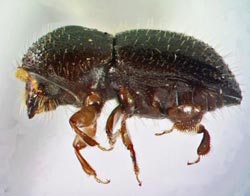Beetle-fungus disease threatens crops and landscape trees in Southern California

This photo shows a close-up of the Tea Shot Hole Borer, which spreads a fungus that threatens avocado and other trees. Credit: Gevork Arakelian<br>
A plant pathologist at the University of California, Riverside has identified a fungus that has been linked to the branch dieback and general decline of several backyard avocado and landscape trees in residential neighborhoods of Los Angeles County.
The fungus is a new species of Fusarium. Scientists are working on characterizing its specific identification. It is transmitted by the Tea Shot Hole Borer (Euwallacea fornicatus), an exotic ambrosia beetle that is smaller than a sesame seed. The disease it spreads is referred to as “Fusarium dieback.”
“This beetle has also been found in Israel and since 2009, the beetle-fungus combination has caused severe damage to avocado trees there,” said Akif Eskalen, an extension plant pathologist UC Riverside, whose lab identified the fungus.
To date, the Tea Shot Hole Borer has been reported on 18 different plant species worldwide, including avocado, tea, citrus, guava, lychee, mango, persimmon, pomegranate, macadamia and silk oak.
Eskalen explained that the beetle and fungus have a symbiotic relationship.
“When the beetle burrows into the tree, it inoculates the host plant with the fungus it carries in its mouth parts,” he said. “The fungus then attacks the vascular tissue of the tree, disturbing water and nutrient flow, and eventually causing branch dieback. The beetle larvae live in galleries within the tree and feed on the fungus.”
Although the beetle was first detected in Los Angeles County in 2003, reports of its negative impact on tree health were paid no attention until February 2012, when Eskalen found both the beetle and fungus on a backyard avocado tree showing dieback symptoms in South Gate, Los Angeles County. The Agricultural Commissioner of Los Angeles County and the California Food and Drug Administration have confirmed the identity of the beetle.
“This is the very same fungus that caused avocado dieback in Israel,” Eskalen said. “The California Avocado Commission is concerned about the economic damage this fungus can do to the industry here in California.
“For now, we are asking gardeners to keep an eye on their trees and report to us any sign of the fungus or beetle,” he added. “Symptoms in avocado include the appearance of white powdery exudate in association with a single beetle exit hole on the bark of the trunk and main branches of the tree. This exudate could be dry or it can appear as a wet discoloration.”
A team of UCR scientists has been formed to study Fusarium dieback in Southern California. Eskalen and Alex Gonzalez, a field specialist, are already conducting a survey to determine the extent of the beetle infestation and the likely extent of the fungus infection in avocado trees and other host plants. Richard Stouthamer, a professor of entomology, and Paul Rugman-Jones, an associate specialist in entomology, are studying the biology and genetics of the beetle.
Members of the public can report sightings of the Tea Shot Hole Borer and signs of Fusarium dieback by calling (951) 827-3499 or emailing aeskalen@ucr.edu.
The University of California, Riverside (www.ucr.edu) is a doctoral research university, a living laboratory for groundbreaking exploration of issues critical to Inland Southern California, the state and communities around the world. Reflecting California's diverse culture, UCR's enrollment has exceeded 20,500 students. The campus will open a medical school in 2013 and has reached the heart of the Coachella Valley by way of the UCR Palm Desert Center. The campus has an annual statewide economic impact of more than $1 billion. A broadcast studio with fiber cable to the AT&T Hollywood hub is available for live or taped interviews. UCR also has ISDN for radio interviews. To learn more, call (951) UCR-NEWS.
Media Contact
More Information:
http://www.ucr.eduAll latest news from the category: Agricultural and Forestry Science
Newest articles

Magnetic tornado is stirring up the haze at Jupiter’s poles
Unusual magnetically driven vortices may be generating Earth-size concentrations of hydrocarbon haze. While Jupiter’s Great Red Spot has been a constant feature of the planet for centuries, University of California,…

Cause of common cancer immunotherapy side effect s
New insights into how checkpoint inhibitors affect the immune system could improve cancer treatment. A multinational collaboration co-led by the Garvan Institute of Medical Research has uncovered a potential explanation…

New tool makes quick health, environmental monitoring possible
University of Wisconsin–Madison biochemists have developed a new, efficient method that may give first responders, environmental monitoring groups, or even you, the ability to quickly detect harmful and health-relevant substances…



